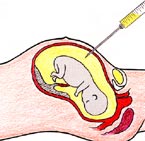 The alpha-fetoprotein (AFP) is a protein of fetal serum (hence its name) that slowly disappears after birth, replaced with albumin, and is then presented to trace.
The alpha-fetoprotein (AFP) is a protein of fetal serum (hence its name) that slowly disappears after birth, replaced with albumin, and is then presented to trace.
His reappearance in children or adults is observed in cancers of the liver and testis.
During pregnancy it is found in maternal blood with a significant concentration up to 32 weeks and then decreases.
Indications:
• Search for a suspected testicular cancer before a volume increase scholarships, gynecomastia, acute testicular pain.
• Search for hepatocellular carcinoma in front of a large liver.
• Search for hepatocellular carcinoma in a patient monitoring for liver cirrhosis or chronic hepatitis B.
• Finding a prenatal trisomy 21.
• Search for a non-closure of the neural tube.
Sample:
Venous blood clotted.
Typical values:
• Adults:
<20 ng / ml (<20 mg / L)
• In children at birth:
10 000 à 100 000 ng / mL
• rapid decay in a few weeks. The rates of adults are affected by the age of 8 months.
• In pregnant women (32 weeks):
<300 ng / mL
Interpretation:
Hepatocarcinomas:
AFP is a marker of hepatocellular carcinoma. A permanent elevation> 400 ng / mL was observed in 70% of these tumors.
The assay is very sensitive because 10-30% of hepatocellular carcinomas are little or no secreting. It is not specific as frank elevations (below, it is true, 400 ng / ml) were observed in chronic hepatitis and cirrhosis of uncomplicated carcinoma.
In contrast, the AFP assay is a good monitoring element after removal of the tumor. A marked reduction is the witness of an effective treatment.
An ascent is the sign of a progressive recovery.
Testicular cancer:
In front of a big testicle elevated AFP> 400 ng / mL associated with elevated beta-hCG (β-hCG) is in favor of a nonseminoma testicular tumor.
The AFP assay is especially important for therapeutic monitoring.
Healing can be stated that if AFP returns to the usual values. Any rise evokes a recurrence.
Testicular germ cell tumors:
Testicular germ cell tumors (90% of testicular cancers) are cancers of the young man, and include a share of seminomas (treated with radiotherapy), and also embryonic tumors (under the chemotherapy).
Other Cancers:
AFP is high (generally moderately) in many cancers: ovarian cancer especially, but also cancers of the pancreas, stomach or bronchial (even in the absence of liver metastases).
Screening for fetal malformations during pregnancy:
In case of neural tube defects (spina bifida, anencephaly), AFP increases dramatically in the amniotic fluid collected by early amniocentesis between the 14th and the 17th week. This dosage is needed in case of family history and in women who have had a child with one of these defects.
The measurement of plasma AFP associated with that of the free fraction of β-hCG, PAPP-A (pregnancy-associated plasma protein A), possibly unconjugated estriol fraction between the 14th and the 17th week of amenorrhea, assesses the risk of trisomy 21, the most common chromosomal abnormalities.
The risk of Down syndrome is indicated by an increase and a decrease in hCG AFP.
The dosage of these markers associated with the measurement of nuchal translucency ultrasound, used to evaluate the risk of trisomy. This risk is calculated by software taking into account, in addition to the values found, the woman’s age, weight, smoking. When ≥ 1/250, amniocentesis is proposed.

You must be logged in to post a comment.